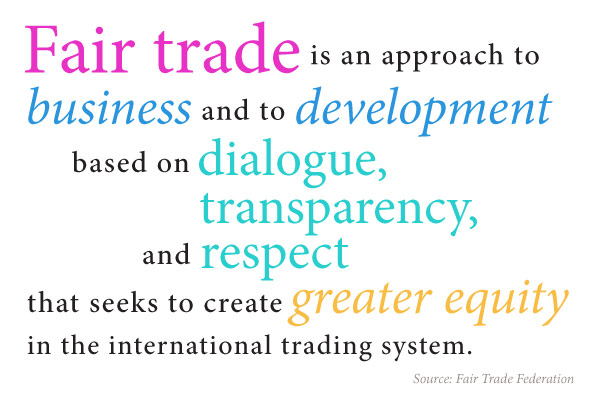One thing I have struggled with as I have changed my shopping habits is explaining to people why choosing fair trade is worthwhile. I sometimes even have a hard time articulating what fair trade is. With this new series “Why Fair Trade?” I plan to share some of the main reasons that fair trade is important to me and how it makes a real and positive difference in people’s lives.
First, let’s start with a basic definition of fair trade:

Source: Fair Trade Federation
What does that mean? Basically, fair trade is a way of doing business that is intentionally designed to be fair to all partners and lead to positive development for participating communities. To me, that sounds like how people and businesses should behave all the time, which is why fair trade is such an obvious choice for me.
So how do fair trade businesses help develop communities? One way is by…
Creating Opportunities for Economically and Socially Marginalized Producers
Fair trade businesses partner with artisans, farmers, cooperatives and other producer groups who are in some way marginalized or disadvantaged in the global marketplace. Producers could live in an impoverished area with few employment options or poor infrastructure, they could be workers gaining job skills after escaping domestic abuse or human trafficking, or they could be independently-owned farms competing with large corporate plantations. These are just a few examples of the types of producers who benefit from fair trade but may not otherwise have the ability to compete in the conventional marketplace.
By choosing to work with these types of producers, fair trade businesses offer workers a sustainable way to increase their income and quality of life. This development comes through safe and fair employment, not through charity, which helps communities break the cycle of poverty.
Beyond just creating an initial opportunity, fair trade businesses also help producers build their capacity by forming long-term partnerships and providing training on product design, finance, and other business skills.
Here is an example of how one fair trade business, Greenola, created opportunity for women to lift themselves out of poverty:
In Bolivia, Greenola collaborates with sewing cooperatives, particularly cooperatives of indigenous women, to create fun, fashionable clothing.
The women are doubly disadvantaged. Bolivian society often undervalues the worth of women in the workplace and many of their 50+ artisan partners have faced a lifetime of racism and discrimination because of their Quechua heritage. […]
Greenola has helped the women organize and provided start-up loans and regular orders so that the women could improve their own lives, receive a living wage, and be connected to the global market. Socially, Greenola also facilitates opportunities for the women to manage, operate, and innovate within their cooperatives.
Source: Fair Trade Federation
I hope that explanation sheds some light on how fair trade can truly improve lives. Do you have questions about fair trade? Let me know and I’ll try to answer them in a future post!
